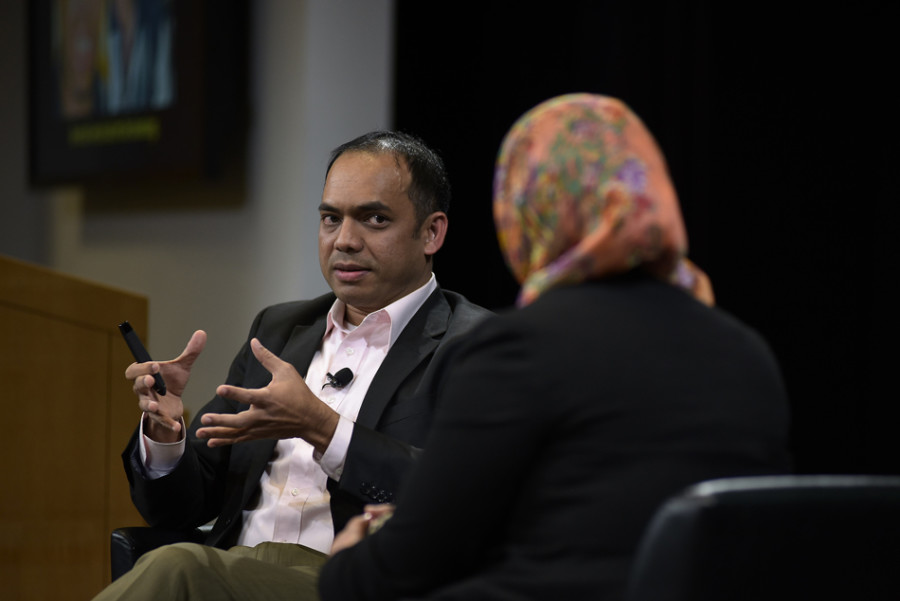Activist calls for compassion, forgiveness to achieve tolerance
Rais Bhuiyan, who was shot in the face by a white supremacist in the wake of Sept. 11, speaks about forgiving his attacker Friday. The event was co-hosted by the Muslim-cultural Students Association and the South Asian Student Alliance.
March 1, 2015
Activist Rais Bhuiyan emphasized the importance of mercy, compassion and forgiveness to bridge religious and cultural divisions during a discussion co-hosted by the Muslim-cultural Students Association and the South Asian Student Alliance on Friday.
About 50 people attended the event at the McCormick Foundation Center Forum.
During the event, Bhuiyan shared his personal story. An immigrant to the United States from Bangladesh, Bhuiyan was working at a Texas convenience store a few weeks after the Sept. 11 attacks when a white supremacist Mark Stroman entered the store and shot Bhuiyan in the right side of his face.
Tahera Ahmad, the University’s associate chaplain and moderator for the event, asked Bhuiyan how he was able to cope in the aftermath of the attack. Bhuiyan, who said he lost vision in one eye and a tooth which eventually was replaced, fell behind on his medical bills and to this day has more than 30 pellets lodged in the right side of his face.
Instead of resenting his attacker, Bhuiyan said he chose to forgive Stroman and began a campaign to appeal his death sentence.
Stroman was a “victim of society,” Bhuiyan said. He came from a poor family, wasn’t well-educated and “he thought every foreigner who earned money was taking it out of his pocket.” Bhuiyan said the events of Sept. 11 only added fuel to Stroman’s resentment.
Bhuiyan said by allowing Stroman to live, he “could learn from his mistakes and contribute to society in a positive way.”
Stroman did change. After hearing that Bhuiyan forgave him and started a campaign to appeal his death sentence, Stroman “was reduced to tears,” Bhuiyan said. “He couldn’t believe Muslims would react in that way.”
Stroman went on to denounce his previous beliefs and apologized to Bhuiyan. Even though his appeal was denied, Bhuiyan said, shortly before Stroman was executed in 2011 they spoke on the phone and he was surprised to hear Stroman tell him, “I love you, bro.”
Bhuiyan said Stroman’s change of heart demonstrated how much people can grow.
“This is the same man, 10 years back, shot me in the face and put me through unbelievable pain and suffering,” Bhuiyan said, “and it’s the same man, 10 years after, who’s calling me his brother.”
Bhuiyan, who is now a peace activist and the founder of the organization World Without Hate, said it wasn’t easy to restart his life after his attack. Bhuiyan said besides his strong religious beliefs, his faith in humanity was instrumental in helping him put his life back together and forgive Stroman. After the discussion, Bhuiyan told The Daily that he does not see people “as Muslims or Christian, or white or Chinese or Korean. I see them as a human being.”
“More respectful dialogue” is key to initiating progress, Bhuiyan said. “No matter how bad the situation,” as demonstrated by the recent Chapel Hill shootings, Bhuiyan said, “There is always room for discussion and dialogue.”
Bhuiyan told the audience it’s important to break barriers and make connections, which means learning about and accepting other cultures.
“If you’re a Muslim, I would say, please visit churches, go to temple,” Bhuiyan said. “If you’re non-Muslim, go and see what is happening in the mosques.”
To combat hate and ignorance, people have to ask themselves how they can contribute, instead of pinning responsibility or blame on others, Bhuiyan said.
Sara Fadlalla, a Communication senior and a member of McSA, said she had heard of Bhuiyan’s story before, but “having him actually come and share it was really powerful.”
However, she said she disagreed with Bhuiyan’s idea that there is always room for dialogue, especially in the case where different groups operate on uneven playing fields.
“If one group is oppressed, and one is in a seat of oppressing,” Fadlalla said, “I don’t think necessarily dialogue would work in that case.”
For Weinberg freshman and co-president elect of SASA, Anna Radakrishnan, who played a big role in organizing the discussion, events “like this one today, are really going to help educate the community … from tolerance to acceptance.”
Correction: A previous version of this story misstated Anna Radakrishnan’s organization. She is co-president elect of SASA. The Daily regrets the error.
Email: weizheyang2018@u.northwestern.edu
Twitter: @_rachelyang



